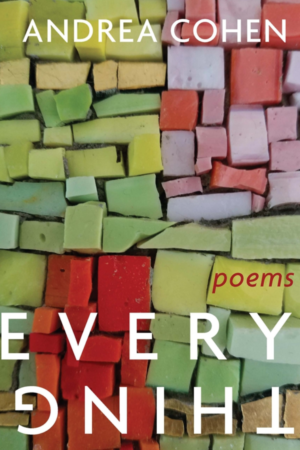Everything
by Andrea Cohen
reviewed by Jason Tandon
A 2021 Guggenheim Fellow and current director of the storied Blacksmith House Poetry Series in Cambridge, Massachusetts, Andrea Cohen has published two poetry collections, both from Four Way Books, in the last two years: Nightshade in 2019 (which this reviewer highly recommends) and, this year, Everything. Divided into four sections, Everything contains ninety-nine poems, many of them just ten lines or fewer. American poet Lorine Niedecker’s nine-line poem “Poet’s work” offers an apt description of Cohen’s poetics. Advised by her grandfather to “learn a trade,” Niedecker declares:
I learned
to sit at desk
and condenseNo layoff
from this
condensery
Cohen’s poem “Craft Talk” hearkens back to Niedecker’s:
I paint
small birds,so when
they flyoff, their
loss mightseem
like less.
This is composition via eyedropper. Cohen deftly and remarkably breaks and punctuates lines for rhythm, emphasis, and irony. Like a jazz musician’s improvisations, her use of space and silence enriches rather than diminishes. It’s a poetics that will be appreciated by readers seeking an alternative to discursive poetry filled with digression and frenetic association.
You get the sense, from Everything’s epigrammatic style, that Cohen enjoyed writing this book. In the two-line poem “Announcement,” for example, she personifies flowers as nobility: “The peonies will / receive you now.” The first lines of “Openings”—“Eternity has closed its doors— / good riddance!”—might have been written by Emily Dickinson, Cohen’s playful compatriot. The speaker concludes in ironic defiance:
[ … ] I didn’t want
forever forever—just this
pear tree, branchesbacklit and the fruits
I can’t get to.
Though full of humor, the book touches on darker subject matter with poems like “No One” (government persecution), “The Bars Insist” (the prison system), “Bruise” (physical abuse), and “Protocol” (the attack on Pearl Harbor and the bombing of Hiroshima and Nagasaki). There are also many poems about love, desire, and the dissolution of romantic relationships. In “Pain and Suffering,” the speaker’s lover
[ … ] recorded
the silencebetween us—
played itback—made
me listen.
The poem “One-Two” portrays two lovers riding a train and explores the idea that despite becoming close with others, our individuated consciousnesses keep us apart:
Being two people, we
got on, and dreamingout one window
went two places.
Everything, as its title suggests, contains pain and loss as well as laughter—an unsettling counterpoint. The poem “Magician,” for example, combines Cohen’s comedic style with scathing self-deprecation:
Anyone can saw
a woman in half.The hard part
is sitting withboth halves at
breakfast, askingone to pass
the salt andthe other to
lick your wounds.That’s what
polyamory is—loving all
the charlatansyou are.
Despite the book’s slyness, Cohen’s speakers admit to rather than cover up their vulnerability and express a persistent need for human connection. The poem “Seaside,” a reflection on the challenges and precariousness of love, weds Cohen’s talents—it is lyrical yet exactingly composed. After planning a “day at the beach,” the speaker wryly comments, perhaps on the relationship itself:
nothing happens without
planning, because we had
to plant the sand andthe idea of happiness.
The poem ends with an acknowledgment of love’s exhilarating ephemerality:
[ … ] All our
pleasures were foraysinto wilds, were carry
in and out—likeour bodies, which
glistened, and were gone.
Everything’s final section contains its darkest poems about the horrors of humanity, among them the sardonic couplet “Safety Glass”: “The rose tint / isn’t optional.” Notes of resilience can be found in poems like “Tool Shed,” where the speaker finds various building materials,
evidence
that many
had come
before me
and from
some shattered
day made
a new
roof rise.
Even in this poem, Cohen maintains a hesitant tone through her clipped lines and commas, an equivocation that forms the basis for “The Blue Chair.” In what might be considered the book’s conclusive statement about human relationships, the speaker muses:
Maybe
we’re all nearly sound-
proof rooms and someone,
if we’re lucky, stands
at the heaviness
of our doors, meaning
to listen.
Hopefulness is conditional, the inner self—as the enjambed phrase “the heaviness / of our doors” suggests—a burden. “Meaning” indicates intent, rather than success. Andrea Cohen’s Everything is not a book of unflagging optimism, but readers who slow down for her spare, quick-witted, and emotionally resonant lyricism will be richly rewarded.
Published on February 15, 2022

